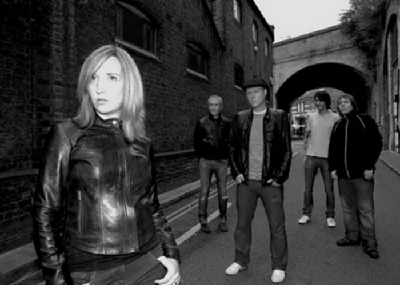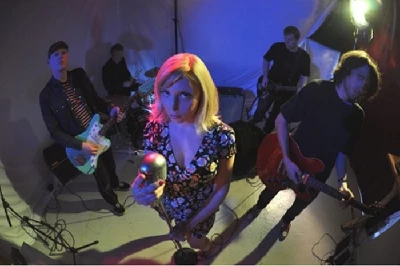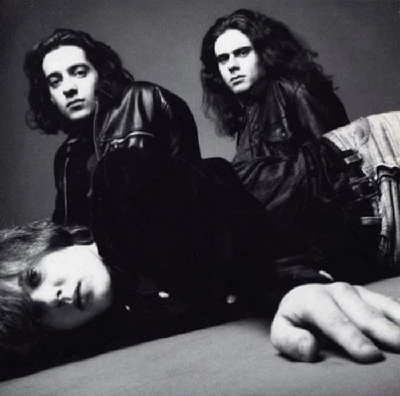Revolver
-
Interview with Mat Flint
published: 28 /
8 /
2011

Mat Flint, the former frontman in underrated early 1990's shoegazing band Revolver and now guitarist in Deep Cut, speaks to Anthony Strutt about both his group and 'Disorientation', Deep Cut's new album
Article
Mat Flint is the current guitarist in Deep Cut and former frontman with Revolver.
Revolver, which consisted of Flint on guitar and vocals, and also drummer Nick Dewey and bassist Hamish Brown, formed in 1990. They were best known for the EP, 'Heaven Sent An Angel' (1991) and their only album, 'Cold Water Flat' (1993), both of which came out on Virgin offshoot label, Hut Records. Revolver were a great shoegaze band. and 'Cold Water Flat' was more diverse than most other albums of the genre, combining this with strong 60's influences. By the time it, however, arrived the shoegaze movement had gone out of fashion and they broke up shortly afterwards.
Deep Cut also features Mat's girlfriend Emma Bailey on vocals, his brother Simon on bass, Ian Button on drums and Pad Bailey on guitar. They released their debut album, 'Through Light Fires', on the shoegaze revival label Club AC30 in 2009 and are about to release their second album, 'Disorientation', again on the same label.
Pennyblackmusic caught up with Mat to ask him about both Revolver and Deep Cut.
PB: Revolver were a three piece signed to Hut but you and Nick were in bands before for three years. Were those anyone that we might have heard of?
MF: I doubt it! My first band was formed at sixth form college. We were called Picturehead - a terrible name - and we did a few gigs in Winchester, where my family had just moved to after I had grown up in the Midlands. We were pretty crap. The songs were okay but our drummer was diabolical. We did a gig with this band called the Biscuit Game, and I was really taken with how brilliant their drummer was. And basically we stole him - and kicked our old drummer out!
That was Nick. We became Picturehead. We did quite a lot of gigs around Winchester and Southampton in late 1988 and 1989. We put out a demo tape that you could buy. It was a real mix of influences though. Nick and I liked more indie type stuff and the singer and the bass player liked the Doors, Led Zeppelin and Janis Joplin, so the whole thing was a bit of a compromise.
I tried touting the demo around. I gave a copy to Bobby Gillespie after a Primal Scream gig once. A couple of months later we went to see the Jesus and Mary Chain at Kilburn National, and the Scream supported. I was standing there in the crowd, and all of a sudden someone tapped me on the shoulder and it was Bobby. He said, "Was it you that gave me that tape?" I said, "Yeah, did you like it?", and he said, "No, not really!"
We kind of knew by this point anyway that we had to move up to London, and make a go of it with a new band with people that were on the same wavelength that we were. So we moved up in the summer of 1990 and took it from there.
PB: The sound of Revolver were influenced by all the Bs in rock - the Beatles, the Byrds and the Beach Boys. Was that also an influence on the haircut and the band's name?
MF: That was one of the things that the journalist went on about in that first 'Melody Maker' interview we did - "They love bands beginning with B". Which we never actually said! The guy didn't bring a tape recorder to the interview which, if we'd been more experienced, we'd have insisted upon.
Consequently that first article was full of shit that we didn't say. Hardly any of it came out of our mouths. I spent years dreaming of being interviewed by the music press, and when it finally happened the article was full of stuff we didn't say, saying that we were part of a scene with all these other bands that we didn't even like. It was very weird. We were getting coverage but being lumped in with groups we didn't rate, and most of it came from that first stupid article.
But back to the question. Yeah, we loved all those bands and still do. Yes, I went for the Byrds haircut. And, yes, we were named after the Beatles album after rejecting 'Rubber Soul' as a name!
PB: The band did several singles for Hut and one LP, 'Cold Water Flat'. Did you find by the time the LP was out that shoegaze was an ugly word?
MF: For sure. I think we got a kicking as we were kind of the "last in, first out". But we only had ourselves to blame really, not releasing our album until nearly two years after we signed our deal. It was career suicide. If we'd have released an album when we were getting all that press attention at the start, it might have been a whole different story.
PB: How did you end up on Hut Records because Creation was the main shoegaze label of the time?
MF: The first labels who were really genuinely interested in signing us were Dedicated and One Little Indian. Dedicated tried desperately to sign us. And for a while we thought we were going to sign for them. One Little Indian dropped out fairly early on as Dedicated were offering more money.
Then Circa got interested - they were the home of Massive Attack and Definition Of Sound at the time - and this appealed to us as they didn't have any of the bands that we were being compared to. You know, one reason we were having doubts about Dedicated was that they already had Chapterhouse. So we thought that Circa sounded good as they were saying that we could go out through our own indie label, which would have independent distribution but be backed by their major cash. They were a subsidiary of Virgin. So we decided to go for that.
Then the day before we were going up to Virgin to sign Alan McGee rang up and asked us to go up to the Creation offices. We had already recorded 'Heaven Sent An Angel', and he asked us to play it to him. So we did, we sat there, and he didn't say anything until it was over, Then he goes, "Look, I can get you in the charts. This single can go Top 40. If you sign to us. I can do it, but I can't offer you the advance that Virgin are offering. But I can license your stuff to some American major for a shitload of money, so you'll be okay." And this completely threw us, because I'd always dreamed of being on Creation. But we'd already kind of committed to Circa/Virgin.
Our manager, however, convinced us to go for it. So we did. As soon as we'd signed, we found out that Circa wasn't going to exist anymore, and that we'd be a Virgin band coming out through Hut. Hut already had Moose, and were about to sign Verve. I was fucking livid - this wasn't what we'd been promised. But that's what happens when you're 19 and you don't know what the fuck you're doing, and you trust other people to help you make good decisions.
The two labels that would have been the best for us, ironically, were One Little Indian and Creation. Proper indie labels, who loved music, and who loved our band. Hut didn't give a shit about our band. We were almost forced upon them.
PB: The LP was quite diverse for a band of the shoegaze era. Did you want to do something a bit different?
MF: Well, yeah. I think I was reacting to the "shoegaze" thing. I couldn't stand being lumped in with fucking Ride all the time! The music I was listening to was stuff like Phil Spector, Brian Wilson and Motown. And I wanted to have a go at that.
Of course, it doesn't sound anything like that but I wanted to try things like string sections, double basses, proper percussion, organs and stuff. I grew tired of the sound of the first couple of EPs very quickly, and wanted to try to do something else. I guess a lot of people would have preferred me to stick to 'Heaven Sent An Angel' and 'Crimson' type stuff - maybe they were right, I don't know.
PB: Was there any music between Revolver and Deep Cut?
MF: Not entirely of my own, no. But lots of other stuff. In 1995 I started DJ-ing at the Heavenly Social club. I used to play hip-hop records. When they moved to Turnmills in 1996 I started doing the opening two hour slot every other week. And through that I met Richard Fearless, who asked me to play bass for Death In Vegas. I was originally only meant to do it for eight gigs but I ended up doing it for ten years! I did every Death In Vegas show from 1996 to 2005, and played on all the records.
When Revolver broke up, I felt so disillusioned with music that I didn't want to be the main guy in a band again, and so joining someone else's band was a great thing for me to do. I got to work with some very talented people who I learned a lot from. But by the time Death In Vegas stopped touring in 2005 when Fearless moved to America, I was ready to start writing some songs again! I can't think of many other people that left it for sixteen years between their own albums!
PB: How did Deep Cut come about?
MF: I started doing some demos with Si - my brother - and Emma, my girlfriend said she wanted to sing. So we put some stuff up on MySpace, and Robin Allport from AC30 heard it, and asked us to do a gig at his club night. We got a band together, and took it from there.
PB: Why did you choose not to sing lead vocals this time?
MF: One of the big things for me when I look back on Revolver is that I should never have been a front man. I only did it because we never found a singer. And when I listen back to the records, I like the guitar but I'm not crazy about a lot of the vocals. So I just wanted to concentrate on the guitar and writing the music. You know, I'm a good guitar player. I'm not that great a singer.
PB: How long has Deep Cut been together, and did you find clubAC30 or did they find you?
MF: We did the first demos early in 2006. Our first show for AC30 was December 2006. They kind of found us, although I think I requested their friendship on MySpace, so interpret that how you like!
PB: Did nugaze influence you to get a new band together?
MF: Not, in the slightest. I just wanted to get back to writing guitar songs myself after playing with Death In Vegas for so long. It had nothing to do with any other bands that were happening at the time. We would have done the same music regardless of what was going on.
PB: How long did the alabum take to write and record?
MF: We started it in the summer of 2009, finished in September 2010. It was mastered by Christmas of last year.
PB: Have your influences changed?
MF: Through the 90s I got much more into electronic music and hip-hop - like a lot of people I knew who came through that late 80s and early 90s indie thing, who didn't identify with Britpop and stuff like that. Dance music was alive, happening, and interesting in the mid 90s, which indie wasn't for me. For a large part of the 90s I didn't really listen to guitar music at all, I went to clubs and bought dance records. I put together a hip hop compilation album that came out on Concrete Records called 'Shoot Tha Pump', and I DJ-d at the Heavenly club for four years or so.
All that had a massive influence on me, as did playing with Death In Vegas. But I suppose that at the end of the day I still really love the things I always did: New Order, the Beach Boys, My Bloody Valentine, Love, Sonic Youth, the Jesus and Mary Chain, Primal Scream, the Stooges, the Beatles and the Byrds.
PB: What are your future plans?
MF: Do some more gigs. Maybe do another single and video and do a new EP in the New Year. Si and I are remixing some bands. I might play on some other people's records. And then start on our next album.
PB: Thank you.
Picture Gallery:-

